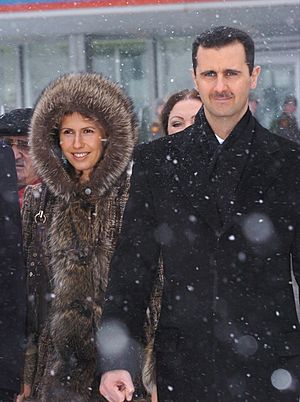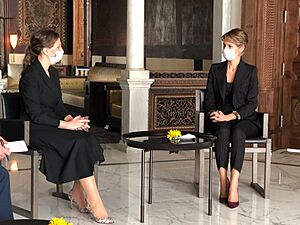Asma al-Assad facts for kids
Quick facts for kids
Asma al-Assad
|
|
|---|---|
|
أسماء الأسد
|
|
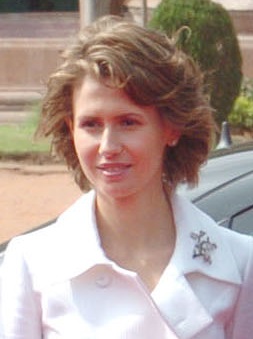
Assad in 2008
|
|
| First Lady of Syria | |
| In role 13 December 2000 – 8 December 2024 |
|
| President | Bashar al-Assad |
| Preceded by | Anisa Makhlouf |
| Succeeded by | Latifa al-Droubi |
| Personal details | |
| Born |
Asma Fawaz Akhras
11 August 1975 London, England |
| Nationality |
|
| Spouse | |
| Children | 3, including Hafez |
| Parents |
|
| Education | King's College London (BSc) |
Asma Fawaz al-Assad (Arabic: أسماء فواز الأسد; née Akhras; born on August 11, 1975) was the former first lady of Syria. She was married to Bashar al-Assad, who was the president of Syria from 2000 until his government was overthrown on December 8, 2024. Asma was born and grew up in London, England. Her parents were Syrian, and she holds both British and Syrian citizenship. She became the First Lady when she married Bashar al-Assad on December 13, 2000.
Asma Fawaz Akhras finished her studies at King's College London in 1996. She earned a bachelor's degree in computer science and French literature. Before her marriage, she worked in investment banking. She was also planning to get an advanced business degree from Harvard University. After marrying Bashar al-Assad in December 2000, she left her banking job. She stayed in Syria, where she and her husband had three children. As First Lady, she helped government groups that worked on social and economic projects. These efforts were part of a plan to improve the country, but they stopped when the Syrian civil war began.
Along with her husband, Asma al-Assad was seen as an important person in Syria's economy. She was involved in many business areas, including banking, telecommunications, and real estate. Because of the ongoing Syrian civil war, which started in March 2011, she faced economic restrictions. These rules made it illegal for people in the European Union (EU) to give her money or certain products. They also limited her ability to travel within the EU.
Contents
Early Life and Education
Asma Fawaz Akhras was born on August 11, 1975, in London. Her parents, Fawaz Akhras and Sahar Akhras, were from Syria. Her father was a heart doctor, and her mother was a retired diplomat. Her parents are Sunni Muslims from the city of Homs.
She grew up in Acton, London. She attended Twyford Church of England High School and later a private girls' school called Queen's College, London. In 1996, she earned a Bachelor of Science degree in computer science from King's College London.
Her Career in Finance
After graduating from King's College London, Asma al-Assad started working as an economics analyst. She worked at Deutsche Bank Group, helping manage money for clients in Europe and East Asia. In 1998, she joined J.P. Morgan, another investment bank. There, she worked with companies in the biotechnology and pharmaceutical fields. She has said that her banking experience helped her think analytically. It also helped her understand how to run a business.
She was planning to get an advanced business degree from Harvard University. However, during a holiday visit to her aunt in Damascus in 2000, she reconnected with Bashar al-Assad. He was a family friend.
Becoming the First Lady of Syria
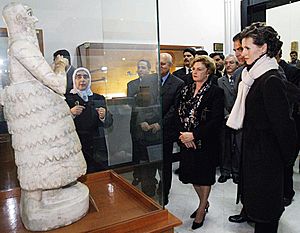
After Hafez al-Assad passed away in June 2000, his son Bashar became president. Asma moved to Syria in November 2000 and married Bashar in December of that year. Their marriage was a surprise to many. There had been no news reports about them dating before the wedding. Many people saw their marriage as a sign of new beginnings for the government. Asma grew up in the United Kingdom and is from the Sunni majority. Bashar is from the Alawite group.
After her wedding, Asma al-Assad traveled across Syria. She visited 100 villages in 13 of Syria's 14 regions. She spoke with people to learn where she could best help. She then created several organizations under a government charity called the Syria Trust for Development. Because of her work, she was recognized as one of the "World's Most Influential Arabs" by Middle East 411 Magazine.
According to media experts, Asma al-Assad focused on supporting women's rights and education. However, she always supported her husband on political matters. The United Nations Development Programme spent money to help organize new projects. These projects aimed to make the Syrian government more modern and forward-thinking. A big part of this effort was to make Asma al-Assad seem like a reformer. Her work with the Syria Trust for Development was highlighted. This program was stopped when the country entered civil war. Asma al-Assad is a Sunni Muslim by birth. Her important role was also helpful for how the Syrian government was seen by the Sunni majority in Syria.
The "Rose in the Desert" Article
In February 2011, Vogue magazine published an article about Asma al-Assad. It was called "A Rose in the Desert" and was written by Joan Juliet Buck. The article described Syria as "a place without bombings, unrest, or kidnappings." It also said the Assad family was "wildly democratic."
The article caused controversy after it was published. Vogue removed it from their website without explanation that spring. When asked why, Vogue's editor said that as the "terrible events" happened in Syria, it became clear that Syria's values were "completely at odds with those of Vogue." The New York Times reported that the Assad family had paid a public relations firm to connect Vogue with the First Lady.
In July 2012, Joan Juliet Buck wrote another article for The Daily Beast. In this article, she was very critical of Asma al-Assad. In August 2012, Buck wrote for The Telegraph. She strongly criticized Asma al-Assad for going along with the government's actions. She called her the "First Lady of Hell." Buck said that "A Rose in the Desert" was not her chosen title. She explained that she finished the article on January 14, the day the president of Tunisia left his country. She told Vogue that the "Arab Spring" was spreading and they might want to wait to publish the article. But Vogue did not think the Arab Spring would go far, and they needed the article for their March "Power Issue." The article went online on February 25, as protests were happening in Libya.
During the Syrian Civil War
Asma al-Assad was criticized for not speaking out when the Syrian uprising began. She made her first public statement to international media in February 2012. This was almost a year after the first serious protests. In an email to The Times, she wrote that the President was for all Syrians. She also said she supported him in his role. The email mentioned her continued support for charities and rural development. It also said she comforted the "victims of the violence."
On March 23, 2012, the European Union froze her money and banned her from traveling. This was part of increasing restrictions against the Syrian government. Asma al-Assad could still travel to the UK because she has British citizenship.
On April 16, 2012, the wives of the German and British ambassadors to the United Nations made a video. They asked Asma al-Assad to speak up for peace. They urged her to ask her husband to stop the violence in Syria.
Asma al-Assad was not seen in public after a bombing in July 2012. This led to rumors that she had left Damascus or the country. She made a public appearance at the Damascus Opera House on March 18, 2013. This event was called "Mothers' Rally," and her appearance stopped the rumors. She made another public appearance in October 2013. Again, she denied rumors of her leaving, saying: "I was here yesterday, I'm here today and I will be here tomorrow."
By 2020, people noticed that Asma al-Assad was becoming more influential in the Syrian government. Her charity, Syria Trust for Development, became active again. She started moving people from that group into more important positions. This included activists from the charity and development sector who were elected during the 2020 Syrian parliamentary election. Nine activists connected to her charity won seats in the Syrian parliament. This gave her a political presence in the parliament. It suggested she would continue to be important in Syrian politics.
In March 2021, a special police unit in London began an investigation. It looked into claims that Asma al-Assad encouraged certain actions during the war. It was reported that she talked with powerful figures to present herself as a possible alternative if Bashar al-Assad were to step down. Ayman Abdelnour, a former government insider, described her path: "At first, she wasn't treated as part of the family... But after 2013 she backed her husband fully. Her position matched whatever he was doing militarily."
Personal Life and Health
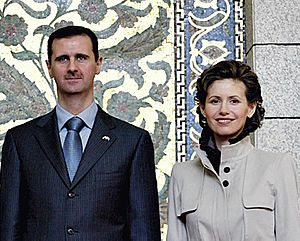
Asma al-Assad first met her future husband during childhood holidays in Syria. They became closer when he moved to London in 1992 to train as an eye doctor. They married after he became president in 2000.
Asma al-Assad and her husband have three children. Their first child, a son named Hafez, was born in 2001. They had a daughter in 2003 and another son in 2005.
Asma al-Assad enjoys theatre, opera, and going to the cinema.
On August 8, 2018, it was announced that she had started treatment for early stage breast cancer. On August 4, 2019, she publicly stated that she had fully recovered and was officially cancer-free.
On March 8, 2021, during the COVID-19 pandemic in Syria, Asma al-Assad and her husband both tested positive for COVID-19. The presidential office reported they were in good health with "minor symptoms." By March 30, it was announced that both had recovered and tested negative.
On May 21, 2024, the Syrian presidency announced that Asma al-Assad had been diagnosed with acute myeloid leukemia. This diagnosis followed several symptoms. She needed to stop direct work and public appearances to focus on her treatment plan.
In late November 2024, she left Syria for Russia with her three children. This happened during the 2024 Syrian opposition offensives and before her husband's government was overthrown. Even though Asma al-Assad has British citizenship, the UK foreign secretary confirmed she was no longer welcome in the United Kingdom due to restrictions against her.
On December 23, 2024, some news outlets reported that Asma had filed for divorce from Bashar while in Russia. However, the Russian government and Asma's father later denied these reports. A few days later, reports revealed that Asma's leukemia had returned after a short period of improvement. She was reported to be in critical condition and receiving close medical care.
See also
 In Spanish: Asma al-Ásad para niños
In Spanish: Asma al-Ásad para niños
 | Claudette Colvin |
 | Myrlie Evers-Williams |
 | Alberta Odell Jones |


